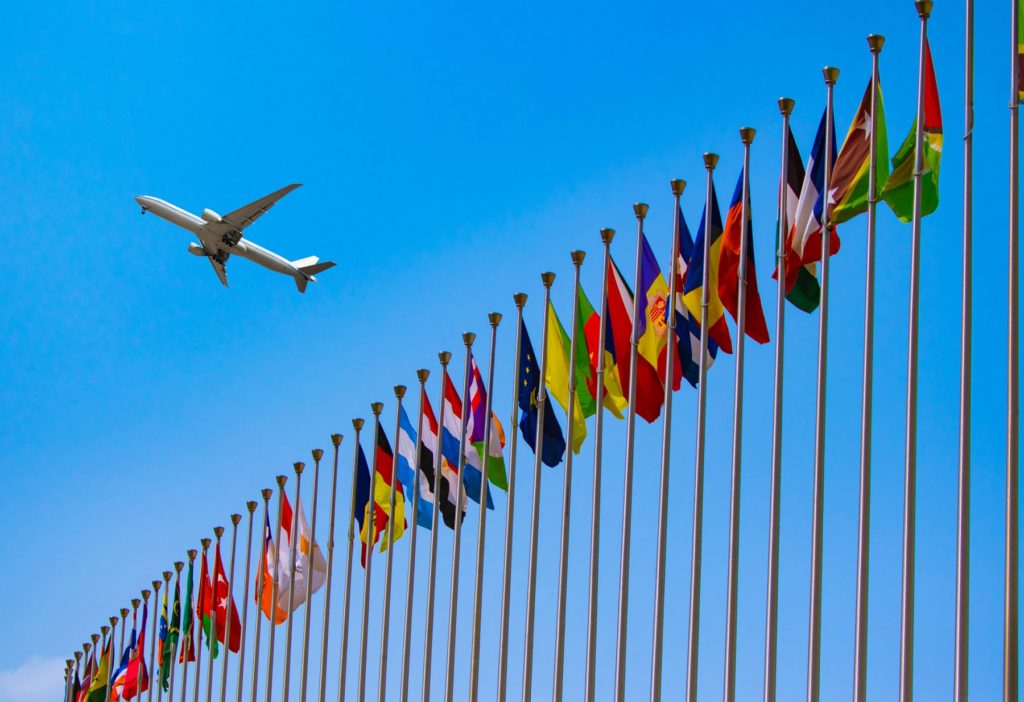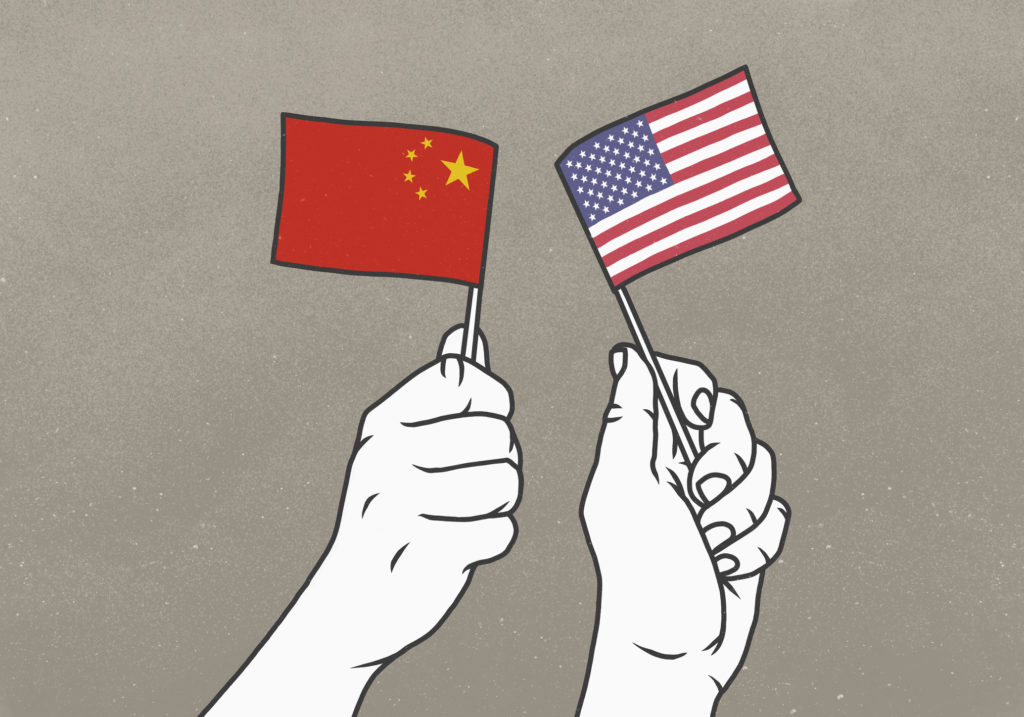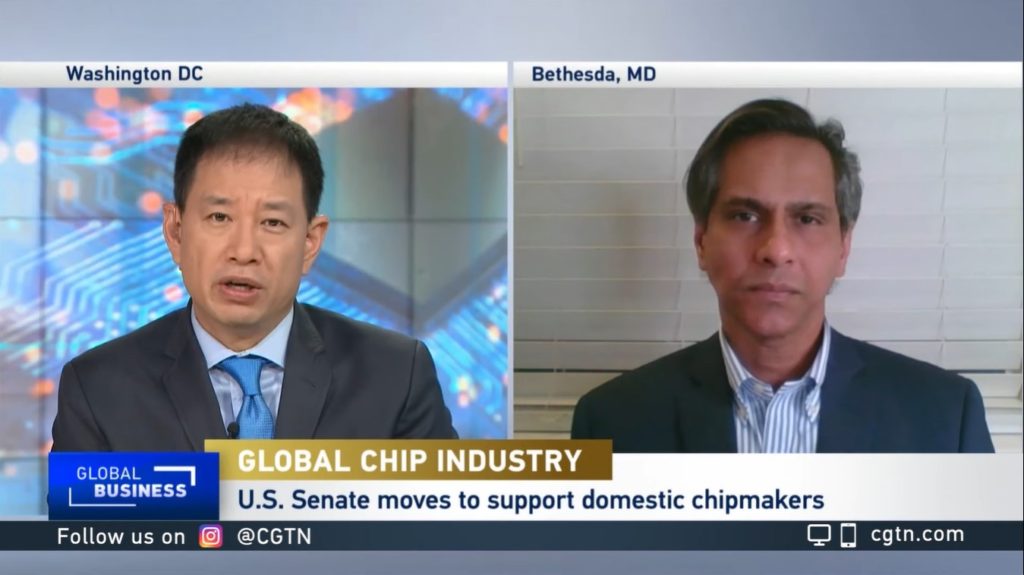
ICAS Bulletin (online ISSN 2836-3418, print ISSN 2836-340X) is published every other week throughout the year at 1919 M St NW, Suite 310, Washington, DC 20036.
The online version of ICAS Bulletin can be found at chinaus-icas.org/bulletins/.

– On August 2, U.S. House Speaker Nancy Pelosi landed in Taipei, despite strong warning from Beijing of “forceful countermeasures” should she visit the island.
– As Pelosi began her tour of Asia in Singapore, the White House “decried” Beijing’s rhetoric, saying it “will not take the bait or engage in saber rattling” and has no interest in increasing tensions.
– In recent weeks, both China and the United States have built up their military strength around Taiwan as tensions rose, with China holding live-fire exercises near Taiwan as the U.S. continues to send naval vessels around the South China Sea and through the Taiwan Strait.
– On July 21, President Biden said the Pentagon advised him that Pelosi’s visit to Taiwan was “not a good idea.”
– Many U.S.-China relations analysts have shared their opinions on the potential outcomes of Pelosi visiting Taiwan, including possibilities of a Taiwan Strait crisis, a naval blockade, differing degrees of military force, and more muted possibilities. Some are drawing comparisons to a similar situation that happened in the late-1990s.
– Chinese Ambassador to the U.S. Qin Gang accused the Biden administration of undermining the ‘One-China’ policy should Pelosi go through with her trip to Taiwan.
Associated News References:
“Nancy Pelosi Visits Taiwan as China-U.S. Tensions Escalate: Live Updates,” The Wall Street Journal, August 2 [Paywall]
“White House decries China rhetoric over Pelosi Taiwan visit,” AP News, August 2
“As Pelosi starts Asia tour, China warns of military action if she visits Taiwan,” CBSNews, August 1
“Pelosi’s Taiwan visit will inflame US-China crisis, analysts warn,” Financial Times, July 29 [Paywall]
“US aircraft carrier group heads towards Taiwan as tension over Nancy Pelosi’s possible visit continues to grow,” South China Morning Post, July 27 [Paywall]
“Pelosi Taiwan visit: Beijing vows consequences if US politician travels to island,” BBC, July 27
“China’s response to Pelosi’s potential Taiwan visit could be ‘unprecedented’ but military conflict unlikely, experts say,” CNN, July 26
“U.S. Officials Grow More Concerned About Potential Action by China on Taiwan,” The New York Times, July 25 [Paywall]
“China Envoy Says US Is Blurring ‘One China’ Policy on Taiwan,” Bloomberg, July 20 [Paywall]
“Taiwan’s speaker warns of Chinese ambitions in Prague, China protests,” South China Morning Post, July 20 [Paywall]

– On July 28, U.S. President Joe Biden and China’s President Xi Jinping held a two-hour long phone call to discuss Taiwan and other issues.
– A U.S. state department official said China is increasing “provocations” against other South China Sea claimants and warned of a consequential “major incident or accident” in the region.
– USAID head Samantha Power urged China to “transparently” participate in debt relief talks for Zambia and Sri Lanka and to restructure debt to the same extent as other creditors.
– U.S. Deputy Secretary of State Wendy Sherman and U.S. Ambassador to Australia Caroline Kennedy have announced plans to visit the Solomon Islands in early August.
– U.S. General and Chairman of the Joint Chiefs of Staff Mark Milley said that the Chinese military has become noticeably more aggressive in the Pacific region.
– Central Intelligence Agency Director Bill Burns said that Beijing is increasingly likely to use force to control Taiwan “further into the decade” but that the Ukraine crisis has likely made China second-think “how and when” they should do it.
– The former CEO of Wynn Resorts Ltd. called on a U.S. judge to dismiss a lawsuit which would compel him to register as a Chinese agent, arguing that mere contact with a Chinese official with whom he had no arrangement of any kind is not in violation of the Foreign Agents Registration Act, and that his prosecution would set a dangerous precedent.
Associated News References:
“Biden, Xi Plan In-Person Meet as Taiwan Tensions Intensify,” Yahoo!News, July 29
“Biden and Xi Conduct Marathon Call During Time of Rising Tensions,” The New York Times, July 28 [Paywall]
“U.S. says Beijing’s South China Sea ‘provocations’ risk major incident,” Reuters, July 27 [Paywall]
“USAID Chief Urges China to Restructure Debts for Fragile Economies,” The Wall Street Journal, July 27 [Paywall]
“Exclusive: Sherman, Kennedy to visit Solomons, where fathers fought and U.S. now vies with China,” Reuters, July 24 [Paywall]
“Milley: China more aggressive, dangerous to US, allies,” AP, July 24
“Ukraine making China rethink when, not whether, to invade Taiwan: CIA chief,” Yahoo!News, July 20
“Steve Wynn Seeks to End US Case Urging China Agent Registration,” Bloomberg, July 19 [Paywall]

– Chinese solar companies are increasingly moving their operations to Southeast Asia to avoid U.S. and EU tariffs and sanctions on solar imports from China.
– A Senate Republican report said that China is trying to obtain confidential data about the U.S. economy from the Federal Reserve system. China rejects the claim, calling it a “political lie.”
– Some U.S.-based companies are moving operations away from China and back to the United States, noting high shipping costs that outweigh cheap labor and manufacturing capability in China.
– Adidas said that it made less profit than expected in Greater China for the second quarter of this year, noting slow recovery of sales.
– The International Monetary Fund warned of a potential global recession due to economic slowdowns in the United States, China and Europe.
Associated News References:
“Chinese solar firms ramping up investment in Southeast Asia to evade US, European trade tensions,” South China Morning Post, July 29 [Paywall]
“China targets Fed to gain influence, senator charges, drawing Powell rebuke,” POLITICO, July 27
“China rejects report it tried to obtain Federal Reserve data,” AP, July 27
“China Targeted Fed to Build Informant Network and Access Data, Probe Finds,” The Wall Street Journal, July 26 [Paywall]
“Companies Shift to Remove China From the Supply Chain,” The Wall Street Journal, July 26 [Paywall]
“Adidas Issues Profit Warning Amid China Lockdown Woes,” Bloomberg, July 26 [Paywall]
“The I.M.F. warns that a global recession could soon be at hand.,” The New York Times, July 26 [Paywall]

– The Biden administration is evaluating whether to restrict exports of U.S. semiconductor manufacturing equipment to Chinese memory chip makers. The targeted companies could include Chinese production of memory chips without specialized military application.
– China’s Semiconductor Manufacturing International Corp (SMIC) achieved a breakthrough in semiconductor manufacturing technology amidst U.S. sanctions.
– The Biden administration is investigating whether Chinese technology company Huawei obtained sensitive military information through their cell towers. A related FBI report specifically mentioned finding Huawei equipment with the capability to capture and disrupt highly restricted military communications, but said it is unclear if any data was actually intercepted.
– A senior federal prosecutor said that U.S. companies are increasingly storing data on servers in China; a move that complicates U.S. criminal investigations into the data.
Associated News References:
“US considers cutting back on memory chip supplies to China,” Fox Business, August 1
“CNN Exclusive: FBI investigation determined Chinese-made Huawei equipment could disrupt US nuclear arsenal communications,” CNN, July 25
“China’s Top Chipmaker Achieves Breakthrough Despite US Curbs,” Bloomberg, July 21 [Paywall]
“US probes Chinese telecom giant Huawei over potential capture of American military information,” ABCNews, July 21
“Data-hosting in China hampers U.S. law enforcement -prosecutor,” Reuters, July 20 [Paywall]

– Air China Ltd. has begun welcoming regular incoming flights from Tokyo and Paris weeks after China’s Civil Aviation Authority announced a loosening of Covid-19 related travel restrictions.
– On July 25, it was reported that Chinese and American scientists are collaborating on the building of an advanced spectrograph telescope at Caltech.
– An article in Nature magazine by University of Arizona professor Jenny Lee showed that many American scientists are continuing to work with their Chinese peers in spite of the chilling effect of the Justice Department’s counter-espionage ‘China Initiative,’ ended in February of this year amid claims of racial bias and prosecutorial overreach.
– On July 20, President Xi wished President Biden a “speedy recovery” and “deepest sympathies” after the latter tested positive for Covid-19.
Associated News References:
“Beijing Reopens for International Flights After Covid Isolation,” Bloomberg, July 27 [Paywall]
“Chinese and US scientists build bridges with cutting-edge Hale telescope project,” South China Morning Post, July 25 [Paywall]
“US scientists keep ties with Chinese peers despite crackdown: researcher,” South China Morning Post, July 21 [Paywall]
“China’s Xi wishes Biden a ‘speedy recovery’ from Covid,” CNBC, July 20

“CHIPS Act leaves chipmakers facing choice between U.S. and China,” Nikkei Asia, August 2 [Paywall]
“U.S. needs full access to Chinese company audit papers to resolve accounting dispute -watchdog,” Reuters, August 2 [Paywall]
“U.S. vs. China: What Aircraft Carriers Reveal About the Military Tech Race [VIDEO],” The Wall Street Journal, July 29 [Paywall]
“China rocket: Uncontrolled return to Earth raises concern,” BBC, July 29
“Russia supports ‘one China’ policy on Taiwan, Lavrov says,” Reuters, July 29 [Paywall]
“China announces three exercises in S. China Sea as Taiwan issue raises tensions,” Radio Free Asia, July 29
“US Films Will Return to Chinese Theaters, Imax CEO Predicts,” Bloomberg, July 28 [Paywall]
“Hong Kong should ditch China-imposed national security law: UN panel,” Reuters, July 27 [Paywall]
July 26 hosted by Center for Strategic and International Studies
July 26 hosted by Atlantic Council
July 21 hosted by SupChina
July 20 hosted by the U.S.-China Business Council
August 3 hearing by U.S.-China Economic and Security Review Commission
August 4 by Atlantic Council
August 4 hosted by US-Asia Institute
August 4 hosted by SupChina
It is What You Make of It:
U.S.-China Military-to-Military Relations Beyond the 19th Shangri-La Dialogue
By Jessica Martin and Yilun Zhang
July 2022
Executive Summary (Excerpts):
“Celebrating its 20th anniversary, the annual Shangri-La Dialogue held in Singapore in June 2022 brought together dozens of defense ministers and ministry chiefs from over two dozen Asia-Pacific and global countries to discuss and address security issues in the region. The Dialogue has become a beacon of the benefits of face-to-face communication and frankness in a region highly fraught with political, social and historical grievances, disagreements and partnerships. It has also become a trusted space for military leaders of the Asia-Pacific to share their perspectives and priorities with both the public and privately with their peers. This year’s 19th Shangri-La Dialogue, held from 10-12, 2022, fostered particular anticipation on the world stage for two main reasons…”
“By breaking down the content and layout of these speeches, observers can infer further insight into the brief readout summaries provided by Beijing and Washington of the private conversation held on the first day of the Dialogue. Although the known engagement held between China and the United States’ top security officials still included accusations and discontent, the 19th Shangri-La Dialogue is nevertheless a positive starting point to honestly reconstruct U.S.-China military-to-military lines of communication; an invariably essential tool to maintain for all parties…”
“Amidst the growing attention to establishing lines of communication and various upcoming policy releases by both parties, time will tell if either side chooses to take advantage of this opportunity or instead continue to bow to the pervasive negativity clouding today’s U.S.-China relationship. It will be what they make of it.”
George Kennan, “The Sources of Soviet Conduct”, and its Application to the China Challenge
By Sourabh Gupta
July 20, 2022
Key Takeaways
Limits in the Seas No. 150 and the U.S.’s Misinterpretation of ‘Historic Rights’
By Sourabh Gupta
July 26, 2022
In 2013, the Phillipines brought a case against China concerning maritime rights in the South China Sea. It did so under Annex VII of the U.N. Convention on the Law of the Sea (UNCLOS), which establishes a special arbitral tribunal to resolve disputes concerning international agreements between member states. The tribunal issued its decision in Philippines v. China three years later, in July 2016—a landmark ruling that shot down China’s claim to “historic rights”over maritime areas of the South China Sea encompassed by the “nine-dash line.”
Today, the South China Sea Arbitration Award highlights a fallacy in the U.S.’s own analysis of maritime rights.
On Sunday, July 28, 2022, Research Associate Yilun Zhang was interviewed by PressTV regarding Speaker Pelosi’s potential visit to Taiwan and its implications for U.S.-China relations.



On Saturday, July 27, 2022, Senior Fellow Sourabh Gupta discussed the potential visit to Taiwan by Pelosi on CGTN.
On Saturday, July 27, 2022, Senior Fellow Sourabh Gupta discussed U.S.-China relations amid the potential Pelosi visit to Taiwan on Asharq News.
On Saturday, July 22, 2022, Senior Fellow Sourabh Gupta discussed the U.S. Congress voting on the CHIPS Act on CGTN America.

The Institute for China-America Studies is an independent nonprofit, nonpartisan research organization dedicated to strengthening the understanding of U.S.-China relations through expert analysis and practical policy solutions.
1919 M St. NW Suite 310,
Washington, DC 20036
icas@chinaus-icas.org
(202) 968-0595
© 2025 INSTITUTE FOR CHINA-AMERICA STUDIES. ALL RIGHTS RESERVED.